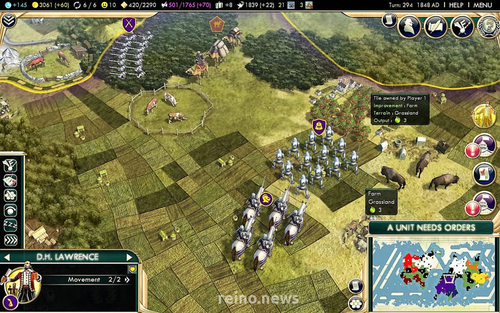
MOL Angus
- recommender
Recommendations: 0
Review: 1
Review: 1

The Games of our People. Analysing Populist Nationalist Rhetorics of the Past in Historical Games
A framework for the analysis of populist nationalist rhetorics in historical games
Recommended by Sebastian Hageneuer based on reviews by Angus Mol, Aris Politopoulos and 1 anonymous reviewerThis paper by Visonà and Cassone (2024) looks on historic video games and populist national rhetoric of the past with the goal of understanding the political implications of historical games today. Based on the works of Chapman et al. (2017) and Reinhard (2018), the paper focuses on political rhetoric and the possibility to provide forms of friction or alternative historical experiences. The paper wants to present an analytical framework to investigate these possibilities in video games and is structured into four parts.
Part 1 (history and digital games) gives a short introduction into the topic of archaeogaming and the development in researching different aspects of video games. It also briefly introduces into the mechanics of knowledge transfer (see also Giere 2019). Part 2 (populist nationalism and the construction of the past) explains the dynamics of populist nationalism of the past and how these same mechanisms are on the rise again today. This makes this paper extremely relevant to today's political situation. Populist movements try to construct a past to form identity, a past that never really existed. These movements then use these identities to justify their political goals.Part 3 (analytical framework) describes the authors framework for analysis. It is structured into a matrix of three dimensions (Identitarian mythopoesis, Unavoidable conflict, Western teleology) by three procedures (Perspective, Connection, Selection), each with distinct questions to ask and answer for the researched video game. Part 4 (implementation) finally discusses how the framework works and presents some practical examples with the help of the games Assassin’s Creed III and Civilization V. The conclusions summarize the paper once more very briefly.
The proposed framework is a very welcome tool in reflecting on video games in terms of the political dimensions represented. The matrix provided can give a hint on what questions to ask and how to analyze the answers. Nevertheless, a little more explanation on how to work with these questions might be helpful, especially for students wanting to utilize this matrix. The two provided examples help a lot, but it might not be clear to everyone how to use the framework. If one does however, this framework can help tremendously in video game analysis with a political focus. This is especially important today with raising populist narratives all over the world. This paper presents a very good starting point on an analytical framework for the analysis of historical video games.
References
Chapman, A., Foka, A., and Westin, J. (2017) Introduction: what is historical game studies? 499 Rethinking History, 21(3), 358-371. https://doi.org/10.1080/13642529.2016.1256638
Giere, D. (2019) Computerspiele - Medienbildung - historisches Lernen. Zu Repräsentation und Rezeption von Geschichte in digitalen Spielen. Forum historisches Lernen. Frankfurt am Main: Wochenschau.
Reinhard, A. (2018) Archaeogaming - An Introduction to Archaeology in and of Video Games. New York - Oxford: Berghahn.
Visonà, M. M. and Idone Cassone, V. (2024) The Games of our People. Analysing Populist Nationalist Rhetorics of the Past in Historical Games. Zenodo, ver.5 peer-reviewed and recommended by PCI Archaeology https://doi.org/10.5281/zenodo.8309653